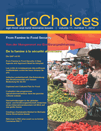
EuroChoices
Scope & Guideline
Exploring the intersection of economics and geography.
Introduction
Aims and Scopes
- Agricultural Policy Analysis:
The journal examines the effectiveness and implications of agricultural policies, including the Common Agricultural Policy (CAP) and eco-schemes, focusing on their impacts on sustainability, economic viability, and social equity. - Sustainable Agricultural Practices:
Research published in EuroChoices emphasizes sustainable practices, including agroecology, precision agriculture, and bioeconomy, aiming to promote environmental sustainability and resilience in agricultural systems. - Food Systems and Security:
The journal addresses issues related to food systems, including food security, consumption trends, and the socio-economic impacts of agriculture, providing insights into how agricultural practices affect food availability and public health. - Economic Impacts of Agriculture:
EuroChoices explores the economic dimensions of agriculture, including market dynamics, price fluctuations, and the impacts of external factors like climate change and geopolitical events on agricultural productivity. - Innovation and Technology in Agriculture:
The journal highlights the role of innovation and technology in transforming agricultural practices, including digitization, data collection, and smart farming solutions that enhance sustainability and efficiency.
Trending and Emerging
- Climate Change and Agriculture:
Recent publications focus heavily on the intersection of climate change and agricultural practices, exploring mitigation strategies, resilience building, and the socio-economic impacts of climate-related policies on farming. - Digital Transformation in Agriculture:
There is a growing emphasis on how digitization and data analytics are transforming the agricultural sector. Research is increasingly addressing the impacts of technology on efficiency, sustainability, and decision-making processes. - Bioeconomy and Sustainable Resource Use:
The bioeconomy is gaining traction as a theme, with research focusing on sustainable use of biological resources, circular economies, and the development of bio-based products as solutions for agricultural sustainability. - Social Equity in Agricultural Policies:
Emerging themes include a focus on social equity, examining how agricultural policies affect various demographics, particularly marginalized groups, and advocating for inclusive policy frameworks. - Resilience to Global Disruptions:
The impact of global events, such as the COVID-19 pandemic and the Ukraine conflict, on food supply chains and agricultural resilience is increasingly prominent, reflecting the need for adaptive strategies in policy and practice.
Declining or Waning
- Traditional Agricultural Practices:
Research on conventional farming methods has diminished, as there is a growing emphasis on innovative and sustainable practices. The shift indicates a move away from traditional approaches towards more modern, eco-friendly alternatives. - General Discussions on Food Security:
While food security remains a critical issue, broader discussions without a specific focus on actionable policies or case studies have become less frequent. Recent publications tend to concentrate on specific case analyses or emerging challenges, rather than general discourse. - Static Economic Models:
The reliance on static models in agricultural economics appears to be waning, as there is a growing demand for dynamic models that can better account for the complexities and rapid changes in agricultural systems influenced by global events and climate change. - Purely Theoretical Frameworks:
There is an observable decrease in purely theoretical discussions without empirical backing. The journal increasingly favors studies that provide practical, evidence-based insights into agricultural policies and practices.
Similar Journals
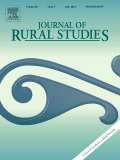
Journal of Rural Studies
Pioneering Studies for Rural ProgressWelcome to the Journal of Rural Studies, a premier peer-reviewed publication dedicated to advancing the field of rural research. Published by PERGAMON-ELSEVIER SCIENCE LTD, this esteemed journal has been a cornerstone of scholarly discourse since its inception in 1985 and continues to evolve through 2024. With an impressive impact factor and categorization in the Q1 tier across various fields, including Development, Forestry, Geography, Planning and Development, and Sociology and Political Science, the journal is among the elite voices in rural studies. Researchers, professionals, and students alike will find invaluable insights within its pages, supported by rigorous empirical research and theoretical explorations that address the complexities of rural life and its myriad challenges. While it currently does not offer open access, the subscription model ensures a broad dissemination of knowledge, fostering collaboration and innovation within the academic community. With a robust Scopus ranking that places it in the top percentiles across multiple social sciences, the Journal of Rural Studies remains an essential resource for those dedicated to understanding and improving rural environments worldwide.

JOURNAL OF AGRICULTURAL AND RESOURCE ECONOMICS
Navigating the complexities of agricultural economics.Journal of Agricultural and Resource Economics is a pivotal platform in the realm of agricultural and resource economics, published by the Western Agricultural Economics Association. Since its inception, the journal has embraced an Open Access model, fostering widespread dissemination of research findings to benefit both scholars and practitioners in the field. The journal operates within an impressive global ranking framework, resting in Q2 across several pertinent categories including Agronomy and Crop Science, Animal Science and Zoology, and Economics and Econometrics. With its ISSN 1068-5502 and E-ISSN 2327-8285, it has garnered attention for its rigorous academic standards and impactful contributions to the discourse on resource management and agricultural practices. Researchers, professionals, and students alike will find the journal's ongoing commitment to advancing knowledge invaluable, with publications that span from 1996 to 2024 capturing evolving trends and insights in the sector.

Journal of Agricultural Sciences
Transforming agriculture through cutting-edge research.Journal of Agricultural Sciences is an esteemed peer-reviewed journal dedicated to advancing research and knowledge in the field of agricultural and biological sciences. Published by Sabaragamuwa University of Sri Lanka, this journal has been an open access platform since 2005, providing valuable insights and innovative findings to a global audience. With an ISSN of 1391-9318 and an E-ISSN of 2386-1363, the journal currently holds a Q3 ranking in the Agricultural and Biological Sciences category, reflecting its commitment to maintaining high standards of scholarship. The journal's Scopus ranking places it at #102 out of 193 in its field, signifying its impact and relevance. Covering a wide range of topics from sustainable agriculture practices to advancements in biological research, the Journal of Agricultural Sciences serves as a crucial resource for researchers, professionals, and students alike, fostering knowledge exchange and promoting agricultural innovation. We invite you to explore our rich repository of research and contribute to the ongoing discourse in the vital area of agricultural sciences.
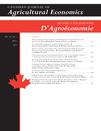
CANADIAN JOURNAL OF AGRICULTURAL ECONOMICS-REVUE CANADIENNE D AGROECONOMIE
Transforming Agricultural Insights into Economic ImpactCanadian Journal of Agricultural Economics - Revue Canadienne d’Agroéconomie, published by Wiley, is a premier journal dedicated to the innovative and interdisciplinary study of agricultural economics. With an impressive impact factor highlighting its significance, this journal consistently ranks in the Q1 quartile across multiple categories, including Agronomy and Crop Science, Animal Science and Zoology, Ecology, Economics and Econometrics, and Global and Planetary Change. As part of its robust content, the journal spans articles from 1952 to 2024, contributing valuable insights into the interface of agricultural practices and economic theory. Researchers and professionals in the field will find this journal essential for exploring critical issues affecting agriculture, food security, and sustainability in a global context. Despite its traditional publishing model, the journal's rigorous peer-review process ensures high-quality scholarly contributions that are pivotal for advancing knowledge and academic discourse in agricultural economics.

NJAS-Impact in Agricultural and Life Sciences
Empowering the dialogue on life sciences and agricultural advancements.NJAS-Impact in Agricultural and Life Sciences is a pivotal open-access journal, published by Taylor & Francis Ltd, focusing on the interdisciplinary nexus between agricultural practices and life sciences. Anchored in the United Kingdom, this journal aims to provide a comprehensive platform for the dissemination of innovative research that addresses critical challenges in environmental sustainability, agricultural productivity, and biological advancements. With its inaugural issue dated from 2023 to 2024, NJAS prominently features the latest empirical studies, reviews, and theoretical contributions that enrich existing knowledge and provoke thought among researchers and practitioners alike. Although currently ranking within the lower percentiles across various Scopus categories, the journal aspires to establish itself as a significant contributor to the dialogue on agricultural and environmental sciences. As scholars in these fields seek to bridge the gaps in understanding, NJAS invites submission from diverse perspectives, underscoring the importance of collaborative knowledge-building in addressing the complexities of our changing global landscape.

PAKISTAN JOURNAL OF AGRICULTURAL SCIENCES
Fostering Sustainable Solutions in Agricultural SciencesWelcome to the Pakistan Journal of Agricultural Sciences, a prominent platform for disseminating vital research findings in the fields of agronomy, crop science, food science, plant science, and soil science. Published by the prestigious University of Agriculture in Faisalabad, this journal aims to enhance the scientific discourse surrounding agricultural innovation and sustainability in Pakistan and beyond. With an ISSN of 0552-9034 and E-ISSN of 2076-0906, the journal serves as a valuable resource for researchers, professionals, and students interested in cutting-edge agricultural developments. As of 2023, the journal is ranked in the Q3 category for Agronomy and Crop Science as well as Food Science and positioned in Q4 for Plant and Soil Science, highlighting its growing impact within a competitive academic landscape. While the Pakistan Journal of Agricultural Sciences is not currently open access, it provides a comprehensive archive of research converging from 2011 to 2024, ensuring that critical knowledge remains accessible to those striving to advance the agricultural sciences. Join us in our mission to foster innovation and support sustainable practices in agriculture.

Future of Food-Journal on Food Agriculture and Society
Pioneering Insights into Food Security and Environmental StewardshipThe Future of Food-Journal on Food Agriculture and Society, published by Kassel University Press GmbH, serves as a vital platform for emerging research at the intersection of food, agriculture, and societal impacts. With an ISSN of 2197-411X and operating within the realms of Agronomy, Ecology, and Food Science, this journal is pivotal for researchers and professionals aiming to address contemporary challenges in the food sector. Although currently ranked in the fourth quartile across its scholarly categories (2023), the journal showcases a wealth of innovative studies, critical analyses, and global perspectives that strive to enhance our understanding of sustainable agriculture practices, food security, and environmental stewardship. The Open Access format encourages wide dissemination and engagement with research findings, making it an essential resource for students and academics alike. As the journal converges from 2013 to 2024, it aims to foster discussions that will shape the future of food systems worldwide.
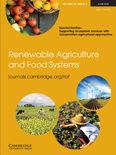
RENEWABLE AGRICULTURE AND FOOD SYSTEMS
Empowering research for renewable agricultural practices.RENEWABLE AGRICULTURE AND FOOD SYSTEMS, published by Cambridge University Press, is a leading open-access journal dedicated to the advancement of sustainability in agricultural practices and food systems. With an ISSN of 1742-1705 and an E-ISSN of 1742-1713, this journal spans the interdisciplinary fields of agronomy and food science, achieving a commendable Q2 ranking in both categories for 2023. As it continues to converge through the years from 2004 to 2024, the journal offers a platform for researchers, professionals, and students to disseminate transformative research that addresses the challenges of food security, resource management, and environmental impact. The journal’s significant impact is underscored by its Scopus rankings, situating it in the 77th percentile among agronomy and crop science publications, and the 67th percentile in food science. Since becoming fully open access in 2023, RENEWABLE AGRICULTURE AND FOOD SYSTEMS promotes wider accessibility to vital research findings, fostering collaboration and innovation in the pursuit of sustainable agricultural practices and food systems worldwide.

African Journal of Agricultural and Resource Economics-AFJARE
Empowering research, transforming resources.African Journal of Agricultural and Resource Economics (AFJARE) is a dynamic publication dedicated to advancing the fields of agricultural and resource economics within the context of Africa. Published by the African Association of Agricultural Economists, this journal serves as a vital platform for researchers, professionals, and students to disseminate their findings and engage with contemporary issues affecting the agricultural sector across the continent. With an ISSN of 1993-3738 and an E-ISSN of 1993-3738, AFJARE aims to reach a wide audience through its commitment to open access, ensuring that crucial research is accessible to all. The journal has recently established itself in the academic landscape, achieving a Q3 ranking in Agricultural and Biological Sciences and a Q4 ranking in Economics and Econometrics for 2023. Covering a diverse scope from 2018 to 2023, AFJARE encourages submissions that explore innovative economic strategies and policies that can foster agricultural development and resource management in Africa. With its growing impact and relevance, AFJARE is poised to become a cornerstone in the discourse on agricultural economics in Africa and beyond.
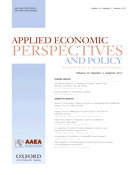
Applied Economic Perspectives and Policy
Unlocking Insights for Effective Development StrategiesApplied Economic Perspectives and Policy is a leading journal published by WILEY, focusing on contemporary issues in economics and development policy. With its commitment to advancing knowledge in these critical fields, the journal boasts an impressive impact factor and consistently ranks in the top quartiles, being categorized as Q1 in both Development and Economics & Econometrics as of 2023. Its Scopus rankings reflect this excellence, placing it at #15 out of 306 in Social Sciences Development and #45 out of 716 in Economics and Econometrics, indicating a prestigious standing within the academic community (95th and 93rd percentiles, respectively). The journal is dedicated to publishing high-quality research that informs policy-making and fosters economic development, inviting submissions that explore innovative solutions to pressing global challenges. As an open-access journal, it ensures widespread visibility and accessibility, encouraging researchers, professionals, and students to engage with the latest findings and contribute to meaningful discussions in the field. With a converged presence from 2010 to 2024, it serves as a vital resource for those looking to stay at the forefront of economic research and policy analysis.